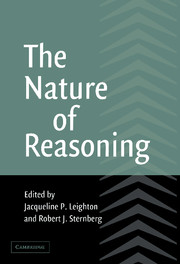Book contents
- Frontmatter
- Contents
- List of Contributors
- PART ONE THE BASICS OF REASONING
- PART TWO THE WORKINGS OF REASONING
- PART THREE THE BASES OF REASONING
- 11 The Assessment of Logical Reasoning
- 12 The Development of Deductive Reasoning
- 13 The Evolution of Reasoning
- 14 Individual Differences in Thinking, Reasoning, and Decision Making
- 15 Teaching Reasoning
- 16 What do We Know about the Nature of Reasoning?
- Index
14 - Individual Differences in Thinking, Reasoning, and Decision Making
Published online by Cambridge University Press: 05 July 2011
- Frontmatter
- Contents
- List of Contributors
- PART ONE THE BASICS OF REASONING
- PART TWO THE WORKINGS OF REASONING
- PART THREE THE BASES OF REASONING
- 11 The Assessment of Logical Reasoning
- 12 The Development of Deductive Reasoning
- 13 The Evolution of Reasoning
- 14 Individual Differences in Thinking, Reasoning, and Decision Making
- 15 Teaching Reasoning
- 16 What do We Know about the Nature of Reasoning?
- Index
Summary
The literature on individual differences in thinking and reasoning is quite scattered and does not form a coherent research paradigm. Instead, it rides parasitically alongside other research programs and other theoretical controversies such as the mental models versus mental-logic debate. Despite its nonprogrammatic nature, work on individual differences in reasoning has begun to provide some insights that would not have been available had the field ignored this important conceptual and methodological tool. In this chapter, we wish to highlight some examples of how work on individual differences serves to clarify issues in the cognitive psychology of reasoning. We will begin by discussing some examples that arise from within some of the well-developed areas in the reasoning literature including: mental logic, mental models, componential analysis, and crosscultural studies in reasoning. We will then discuss three programmatic themes from our own research studies on individual differences to show how we have attempted to demonstrate how individual differences research can lead to cumulative progress on theoretical issues of general importance.
MENTAL LOGIC AND INDIVIDUAL DIFFERENCES
Perhaps the most notable investigation of individual differences carried out within the mental logic (Braine & O'Brien, 1998; Rips, 1994), or mental rules, framework is that of Rips and Conrad (1983). They examined individual differences in reasoning with the propositional connectives if, and, or, and neither.
- Type
- Chapter
- Information
- The Nature of Reasoning , pp. 375 - 409Publisher: Cambridge University PressPrint publication year: 2003
- 5
- Cited by



